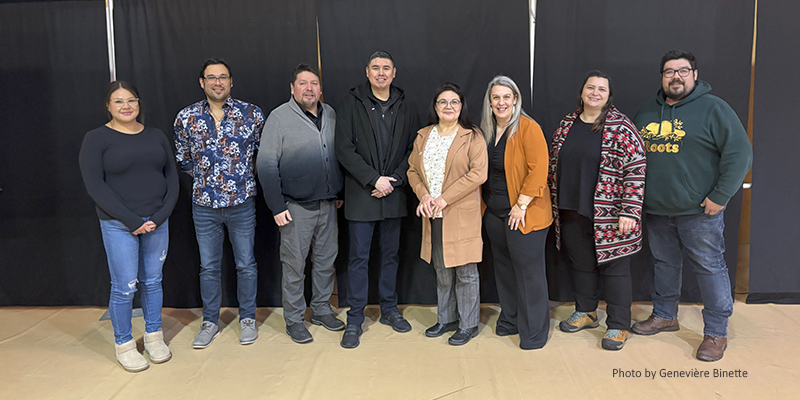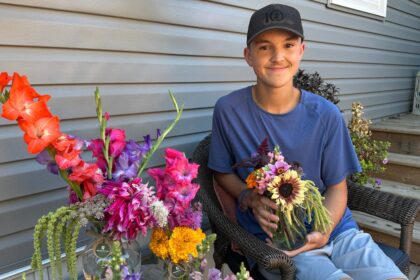Despite a February snowstorm, the Cree Nation Abitibi-Témiscamingue Economic Alliance gathered community members, entrepreneurs and speakers for the Waskaganish business conference, a multi-day event supporting local businesses and economic growth in Eeyou Istchee. In 2024, the Alliance launched the Niimuudaan mentorship program, a culturally tailored service designed by and for the Cree. The initiative is especially designed to uplift Cree women entrepreneurs. In collaboration with Economic Development Officers and the Cree Women of Eeyou Istchee Association (CWEIA), the Niimuudaan mentorship program embodies a vision of inclusive economic growth. According to Geneviève Binette, projects and communication coordinator at the Secretariat to the Cree Nation Abitibi-Témiscamingue Economic Alliance, the program connects budding entrepreneurs with experienced mentors. “The mentorship is about fostering courage,” explained Binette. “Mentors are not there to give advice, they’re really there to make entrepreneurs see what solutions they can apply to be successful.” Binette believes many women in Eeyou Istchee already possess an “entrepreneurial fibre” and are eager to access tools that can help them launch or expand their businesses. “Women want to have success in what they do,” she said. “They had a lot of good advice from keynote speaker Kendal Netmaker, a successful entrepreneur from Sweetgrass First Nation in Saskatchewan, who gave a really good workshop.” Binette stressed the importance of hosting such events in-person in the communities. “We visited the different restaurants and shops they have in Waskaganish,” she said. “It is important to travel to the community and buy in the stores and local businesses.” Binette says the Niimuudaan mentorship program is attracting more mentors and participants to engage with its mission of economic empowerment. Dave Sergerie, a projects coordinator at the First Nations of Quebec and Labrador Economic Development Commission and Anishinaabe from Timiskaming First Nation, highlighted the ID1N (First Nations Identification) webpage dedicated to combat cultural appropriation and protect Indigenous knowledge. Sergerie said this initiative authenticates First Nations businesses through a bear logo created by Anishinabe artist Frank Polson from Long Point in response to concerns over uncredited online use of traditional attributes. “We’re getting close to 600 businesses and entrepreneurs who have registered with us,” he said. “When they register, they can start using the logo, which they put it on their products to authenticate their origin.” Sergerie said it’s not about marketing, it’s about identity. “This is a way for our entrepreneurs to position themselves and fight cultural appropriation,” he said. The ID1N initiative is connected to the Niimuudaan mentorship program. Sergerie encouraged entrepreneurs to register with ID1N to protect their presence in the marketplace. “It’s a great program for many reasons,” he said. “Learning from somebody who has experience is the best way to learn. You can learn through books and training, but through mentoring, you’re learning the most useful information from people who have already done it.” Sergerie also underlined the broader importance of promoting Indigenous businesses. “We all want to improve the socioeconomic conditions in our First Nation communities,” he said. “And one of the best ways to do that is to have people who have projects and who can accomplish their goals and create businesses.”
Friday, 6 Feb 2026
Canada – The Illusion
Search
Have an existing account?
Sign In
© 2022 Foxiz News Network. Ruby Design Company. All Rights Reserved.
You May also Like
- More News:
- history
- Standing Bear Network
- John Gonzalez
- ᐊᔭᐦᑊ ayahp — It happened
- Creation
- Beneath the Water
- Olympic gold medal
- Jim Thorpe
- type O blood
- the bringer of life
- Raven
- Wás’agi
- NoiseCat
- 'Sugarcane'
- The rivers still sing
- ᑲᓂᐸᐏᐟ ᒪᐢᑿ
- ᐅᑳᐤ okâw — We remember
- ᐊᓂᓈᐯᐃᐧᐣ aninâpêwin — Truth
- This is what it means to be human.
- Nokoma











